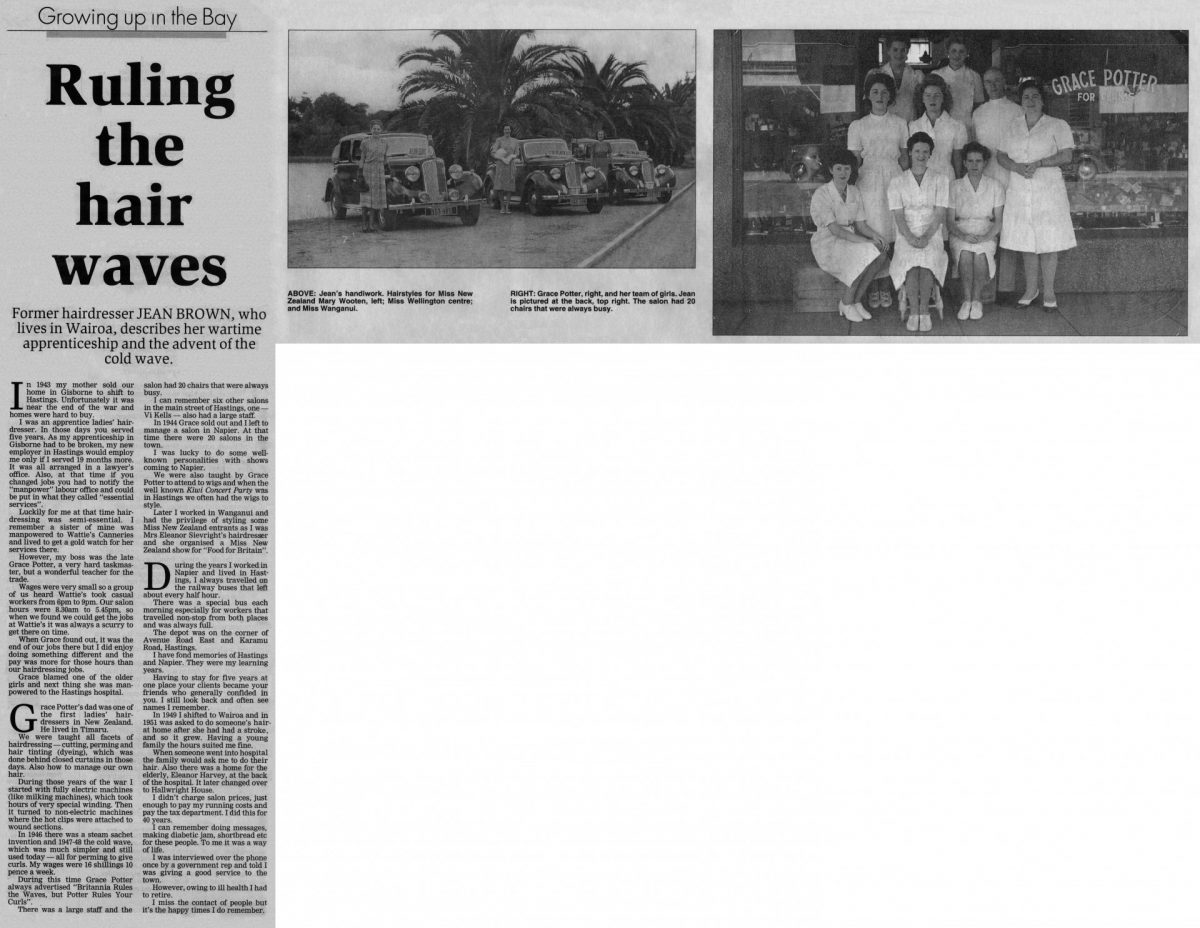Growing up in the Bay
Ruling the hair waves
Former hairdresser JEAN BROWN, who lives in Wairoa, describes her wartime apprenticeship and the advent of the cold wave.
In 1943 my mother sold our home in Gisborne to shift to Hastings. Unfortunately it was near the end of the war and homes were hard to buy.
I was an apprentice ladies’ hairdresser. In those days you served five years. As my apprenticeship in Gisborne had to be broken, my new employer in Hastings would employ me only if I served 19 months more. It was all arranged in a lawyer’s office. Also, at that time if you changed jobs you had to notify the “manpower” labour office and could be put in what they called “essential services”.
Luckily for me at that time hairdressing was semi-essential. I remember a sister of mine was manpowered to Wattie’s Canneries and lived to get a gold watch for her services there.
However, my boss was the late Grace Potter, a very hard taskmaster, but a wonderful teacher for the trade.
Wages were very small so a group of us heard Wattie’s took casual workers from 6pm to 9pm. Our salon hours were 8.30am to 5.45pm, so when we found we could get the jobs at Wattie’s it was always a scurry to get there on time.
When Grace found out, it was the end of our jobs there but I did enjoy doing something different and the pay was more for those hours than our hairdressing jobs.
Grace blamed one of the older girls and next thing she was man-powered to the Hastings hospital.
Grace Potter’s dad was one of the first ladies’ hairdressers in New Zealand. He lived in Timaru.
We were taught all facets of hairdressing – cutting, perming and hair tinting (dyeing), which was done behind closed curtains in those days. Also how to manage our own hair.
During those years of the war I started with fully electric machines (like milking machines), which took hours of very special winding. Then it turned to non-electric machines where the hot clips were attached to wound sections.
In 1946 there was a steam sachet invention and 1947-48 the cold wave, which was much simpler and still used today – all for perming to give curls. My wages were 16 shillings 10 pence a week.
During this time Grace Potter always advertised “Britannia Rules the Waves, but Potter Rules Your Curls”.
There was a large staff and the salon had 20 chairs that were always busy.
I can remember six other salons in the main street of Hastings, one – Vi Kells – also had a large staff.
In 1944 Grace sold out and I left to manage a salon in Napier. At that time there were 20 salons in the town.
I was lucky to do some well-known personalities with shows coming to Napier.
We were also taught by Grace Potter to attend to wigs and when well known Kiwi Concert Party in Hastings we often had the wigs to style.
Later I worked in Wanganui and had the privilege of styling some Miss New Zealand entrants as I was Mrs Eleanor Sievright’s [Sievwright?] hairdresser and she organised a Miss New Zealand show for “Food for Britain”.
During the years I worked in Napier and lived in Hastings, I always travelled on the railway buses that left about every half hour.
There was a special bus each morning especially for workers that travelled non-stop from both places and was always full.
The depot was on the corner of Avenue Road East and Karamu Road, Hastings.
I have fond memories of Hastings and Napier. They were my learning years.
Having to stay for five years at one place your clients became your friends who generally confided in you. I still look back and often see names I remember.
In 1949 I shifted to Wairoa and in 1951 was asked to do someone’s hair at home after she had had a stroke and so it grew. Having a young family the hours suited me fine.
When someone went into hospital the family would ask me to do their hair. Also there was a home for the elderly, Eleanor Harvey, at the back of the hospital. It later changed over to Hallwright House.
I didn’t charge salon prices, just enough to pay my running costs and pay the tax department. I did this for 40 years.
I can remember doing messages, making diabetic jam, shortbread etc for these people. To me it was a way of life.
I was interviewed over the phone once by a government rep and told I was giving a good service to the town.
However, owing to ill health I had to retire.
I miss the contact of people but it’s the happy times I do remember.












Do you know something about this record?
Please note we cannot verify the accuracy of any information posted by the community.